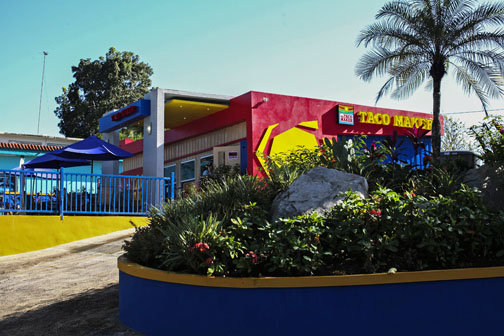Taco Maker grows to U.S., LatAm; launches new concept


The first modular Taco Maker restaurant opened in Morovis in September, with two more planned for Bayamón and Cupey during the first quarter of 2014.
The owners of the Taco Maker chain in Puerto Rico are setting their sights on other markets on the U.S. mainland and in Central and Latin America to fuel growth in 2014, when the company also plans to expand on a newly introduced modular restaurant concept they believe is the cornerstone to successfully bucking local economic conditions.
In an interview with this media outlet, Carlos Budet, president of FransGlobal, which manages the brand in Puerto Rico, said the company’s footprint will include the stateside markets of Miami, Orlando, Las Vegas, Houston and Utah, where they have sold a combined 30 franchise licenses.
In Venezuela, the company is opening its third and fourth restaurants, and has another five license agreements signed for future openings.
“South America will be one of our biggest growth areas because we have less competition, labor is less expensive, and construction is cheaper,” Budet said.
FransGlobal plans to capitalize on its positive experience in Venezuela so far to start up talks with potential franchisees in Costa Rica, Panama and Colombia, Budet added.
“We have a strong case in Venezuela, where our numbers are excellent. It’s not the same to approach someone in Costa Rica and show them the Puerto Rico operation, than to also show them an example of how it’s going in their region,” the executive noted.
Reinventing Puerto Rico strategy
In Puerto Rico, the Taco Maker chain comprises 105 restaurants — a number that will increase in coming months with the addition of at least 15 new eateries in 2014.
Three of those will be in the form of a new modular concept that is smaller, more efficient and less expensive to build, Budet said.
For an investment of about $250,000, a franchisee can build an 864 square-foot version of a Taco Maker, with the same menu and recipes. That cost is about half of what is needed to build a full-scale restaurant, and construction time is between 80 and 120 days, about 35 percent shorter.
“We’re focused on being able to offer clients a more affordable investment option because building a full-scale Taco Maker costs about $500,000, but future and existing franchisees will be able to build their restaurant for half of that, which is much easier to get in this economy,” Budet said, noting FransGlobal has already sold 35 franchise licenses in Puerto Rico for modular and regular restaurants to be built down the road.
“Certainly, in times like these we’re facing, it is imperative that we identify ways to reinvent ourselves, that are innovative and give tools to current or future entrepreneurs to do their part in finding solutions to Puerto Rico’s economic development,” he said. “We’re very excited about the launch of this concept and we’re sure it will be key to our record growth in 2014.”
The first modular Taco Maker restaurant opened in Morovis in September, with two more planned for Bayamón and Cupey during the first quarter of 2014. The Morovis location — which employs about 15 people — has already reflected lower electricity bills of between $900 and $1,100 a month, vs. $2,500 to $3,000 for a full-sized restaurant. The savings are attributed to more efficient kitchen equipment, LED lighting and inverter-based air conditioning systems.
“This smaller concept allows us to have presence in places where perhaps a full-sized restaurant wouldn’t fit,” said Steven McClintock, vice president of sales and marketing for FransGlobal.
The so-called hybrid structure, which combines cement and metal elements, has a seating capacity for 24 people inside and 24 people outdoors, he said.
Despite the planned string of openings, FransGlobal executives acknowledged that about seven Taco Maker restaurants closed in the last year for different reasons, including high operating costs and excessive property rental fees.
“Still, we were able to reopen five of them with new cost structures, and we’re currently supporting franchisees in renegotiating leases,” Budet said.















